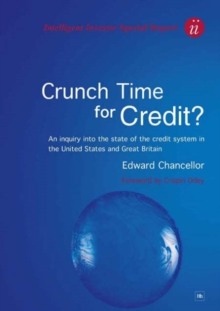US and UK economies 'badly corrupted' by massive growth in debt, according to new independent report by leading UK financial historian.
The credit bubble that has developed in the UK and US economies over recent years is unsustainable and has 'badly corrupted' the economies of the two countries, with potentially serious destabilising results, says a major new study of the economic and investment implications of the build-up of debt in the two countries.
Housing markets look particularly vulnerable in both countries.
The 200-page report, Crunch Time for Credit? by Edward Chancellor, is based on research originally commissioned by Odey Asset Management, the London hedge fund management company.
Chancellor's authoritative history of financial speculation, Devil Take The Hindmost (published in 1999), correctly identified the collapse of the stock market in 2000 and was named one of six "indispensable investment classics" by Money magazine.
In the new report, Chancellor analyses the massive build up of debt in the US and UK, and compares it to several episodes from history, including the Great Depression of the 1930s and recent experience in Japan and Korea. He also chronicles the way that intellectual understanding of credit has developed over the past 300 years.
He concludes: "The growth of credit has created an illusory prosperity while producing profound imbalances in the British and American economies...When credit ceases to grow, the weakened state of these economies will become apparent." "It will also become clear that the credit boom, by inflating asset prices and boosting profits, has lead to inappropriate balance sheets (both for the private sector and in general).
At some stage, balance sheets will have to be adjusted to face a new reality.
The process of adjustment is likely to be painful. It may well end in either an extraordinary deflation...or an extraordinary inflation." Among the report's main findings are: On the global financial system - The Federal Reserve's consistent intervention to maintain financial stability and provide liquidity during recent crises has created "moral hazard on a grand scale' and 'one asset bubble after another".
As a result, the credit system is now "dominated by leveraged short-term speculators" to an unprecedented degree. - A revolution in the financial system, including credit derivatives, has shifted risk throughout the financial system, but risk cannot be destroyed, only redistributed.
The modern credit system has never been stress-tested by a severe recession. - Low inflation and the perception that central banks know how to prevent cyclical downturns has been used to justify higher asset prices and yet more debt.
Investors, says Chancellor, "have failed to consider that lower inflation also implies lower future growth rates for profits and income". - More and more borrowers, both corporations and households, have become what economist Hyman Minsky called 'Ponzi finance units'.
They are dependent on rising asset prices and the refinancing of their liabilities to remain solvent. - The Federal Reserve's 'easy money' response to the technology bubble in 2000 has helped create a "new investment bubble" in China, surging commodity prices and threatens to accelerate the "de-industrialisation of the West".
It has also created a global housing bubble, with mortgage debt at dangerously high levels. - Home-owners, consumers and financial markets will all feel the consequences of the bubble bursting, though whether the outcome is renewed inflation or deflation cannot yet be foretold.
Relevant parallels include the slump of the 1930s, the stagflation of the mid-1970s and the debt deflation in Japan since 1990.
On The UK Housing Market In the section on credit in the UK, the report provides an exhaustive analysis of the UK housing market, and argues that, as in the United States, it is virtually impossible to accept the Bank of England's view that the recent debt-fuelled rise in house prices is a benign and sustainable event.
The UK economy has become "increasingly vulnerable" to a credit crunch, he says.
In a foreword to the report, Crispin Odey, CEO of Odey Asset Management, says: "Not only does he [Chancellor] make a cogent and persuasive case that current trends are unsustainable, but his unique knowledge of the hinterland of previous periods of speculative credit excess also illuminates the range of potential outcomes...There is no question that financial markets are not priced for the sorts of risks that Chancellor identifies."

